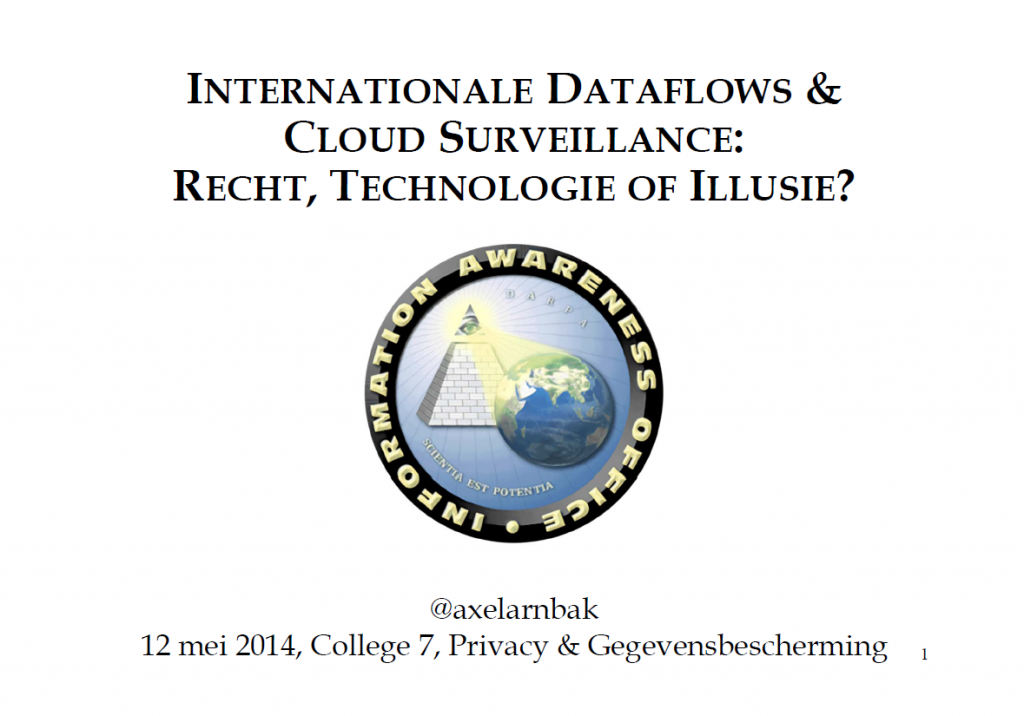Net twee uur college gegeven bij het vak ‘privacy & gegevensbescherming’ aan masterstudenten infomatierecht van de Universiteit van Amsterdam. Het college geeft een overzicht van een paar belangrijke onthullingen rondom de praktijk van intelligence surveillance, plaatst ze in politiek-historisch perspectief en gaat wat dieper in op de beweegredenen van inlichtingendiensten ‘to know it all’. Na de pauze bespreek ik welke oplossingsrichtingen recht, beleid en technologie bieden. Ook een aantal nieuwe onthullingen in het gisteren gepubliceerde boek van Greenwald komen aan bod. Klik op de openingsslide hieronder om alle 100+ slides te zien (geen zorgen, veel plaatjes).
Tag Archives: TLS
Any Colour You Like: the History (and Future?) of Internet Security Policy [talk]
Yesterday, I did a first in a series of talks on over four decades of internet security policies. A tedious piece of research, that I don’t think anyone has done before. It’s a cornerstone of my thesis, and I’m currently finishing a draft chapter/paper on the topic under the same title – borrowing names from Pink Floyd seems to become a tradition of sorts.
So here’s my slides for the 27 March Cyberscholars Working Group at Harvard’s Berkman Center [pdf]. The talk was aimed to be 15 minutes long for a small and general audience, so obviously it’s a bit shallow. Questions, feedback, all more than welcome! I hope to get the paper out by the end of April. The abstract: Continue reading Any Colour You Like: the History (and Future?) of Internet Security Policy [talk]
Governments Pwn The Web: A Constitutional Right to IT-Security? [talk]
The Berkman Center at Harvard has put my 18 March 2014 talk online. My aim was to get people new to the subject thinking about government hacking for spying and policing purposes, that is largely happening without public scrutiny or debate – particularly in the U.S. And what to do about it. States have been hacking since the 1970s, and prominently in the 80s, so my main message in the talk is that the policy debate lags at least three decades behind the technical reality. If you don’t have time to watch a one hour talk, here’s the slides [pdf] and a post for further reading. The talk develops the thoughts in the post a bit further, and sets an agenda for research, law and activism.
Watch Your Mouth: Why Talking ‘(Cyber-)Security’ Is Popular, Complex and Deeply Political
Everybody immediately relates to ‘security’, but may mean something profoundly different. This makes researching ‘security’ both difficult and important. My main concern is that we need a better understanding of what ‘(cyber-)security’ is and what it’s not, precisely because of it’s popular, complex and deeply political properties. Until then, we need to watch our mouth when we talk ‘(cyber-)security’, as ambigous concepts are a battleground for political exploitation. Continue reading Watch Your Mouth: Why Talking ‘(Cyber-)Security’ Is Popular, Complex and Deeply Political
U.S. Citizenship and N.S.A. Surveillance – Legal Safeguard or Practical Backdoor?
Published 15 Oct. 2013 at Freedom to Tinker.
The main takeaway of two recent disclosures around N.S.A. surveillance practices, is that Americans must re-think ‘U.S. citizenship’ as the guiding legal principle to protect against untargeted surveillance of their communications. Currently, U.S. citizens may get some comfort through the usual political discourse that ‘ordinary Americans’ are protected, and this is all about foreigners. In this post, I’ll argue that this is not the case, that the legal backdoor of U.S. Citizenship is real and that relying on U.S. citizenship for protection is not in America’s interests. As a new CITP Fellow and a first time contributor to this amazing blog, I’ll introduce myself and my research interests along the way.  Continue reading U.S. Citizenship and N.S.A. Surveillance – Legal Safeguard or Practical Backdoor?
Continue reading U.S. Citizenship and N.S.A. Surveillance – Legal Safeguard or Practical Backdoor?
